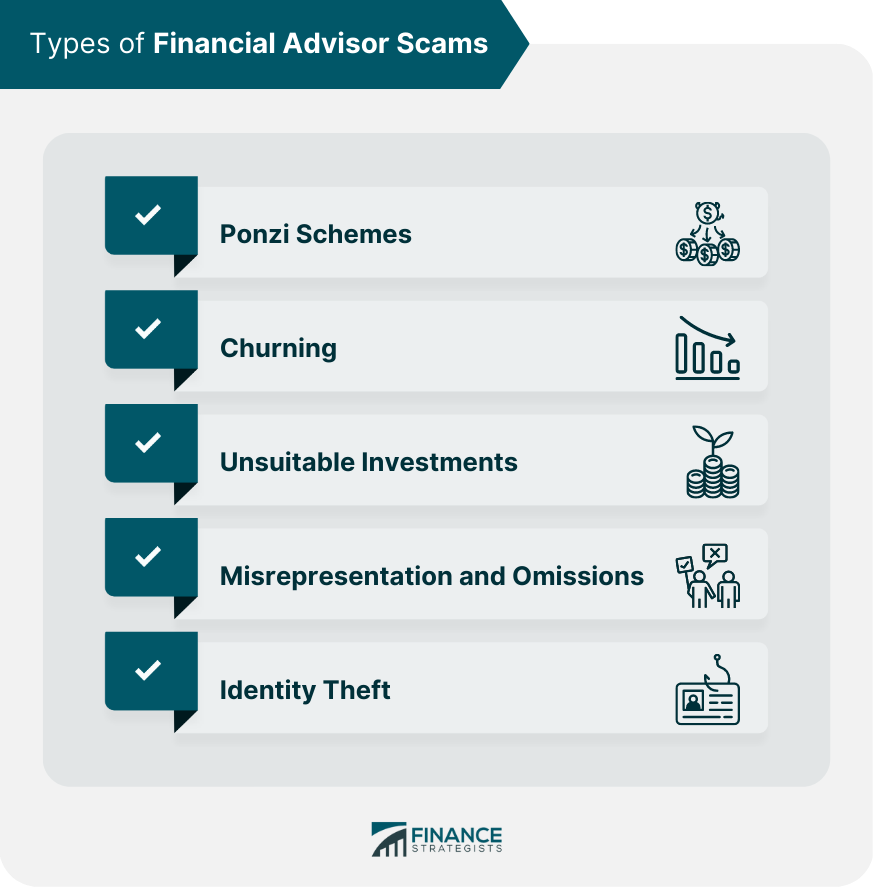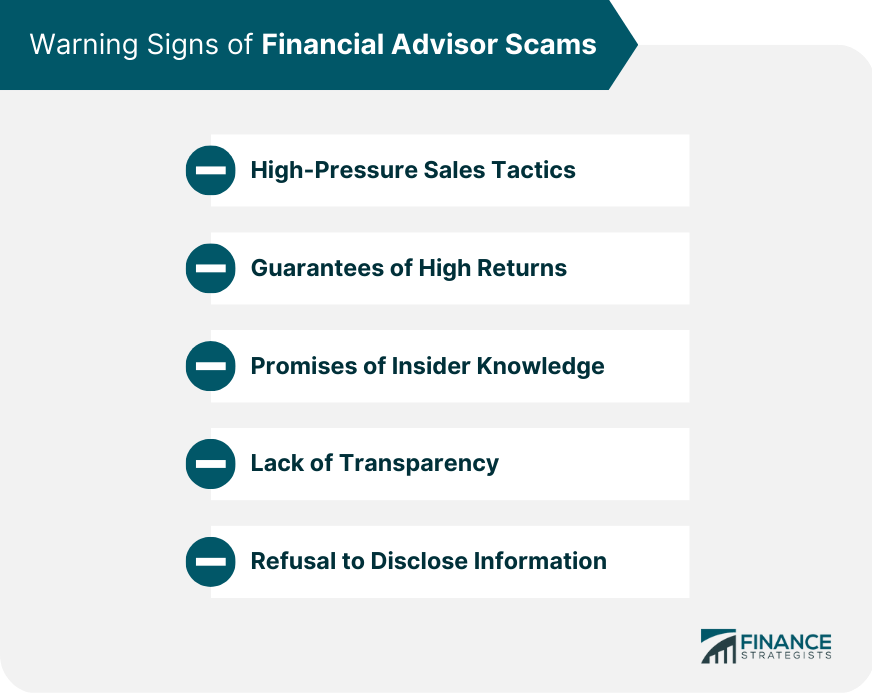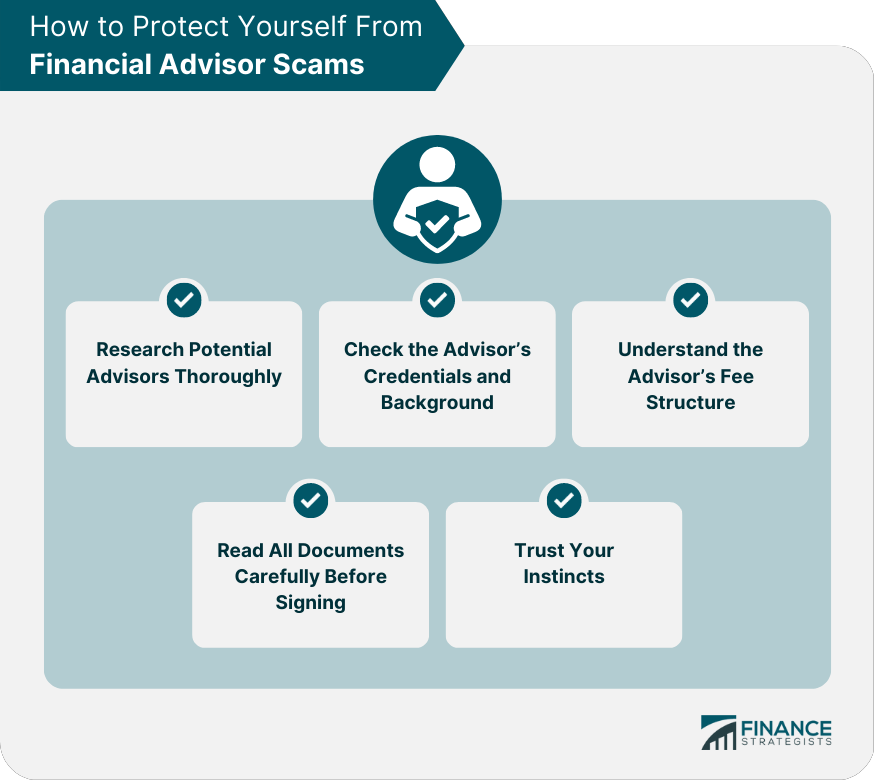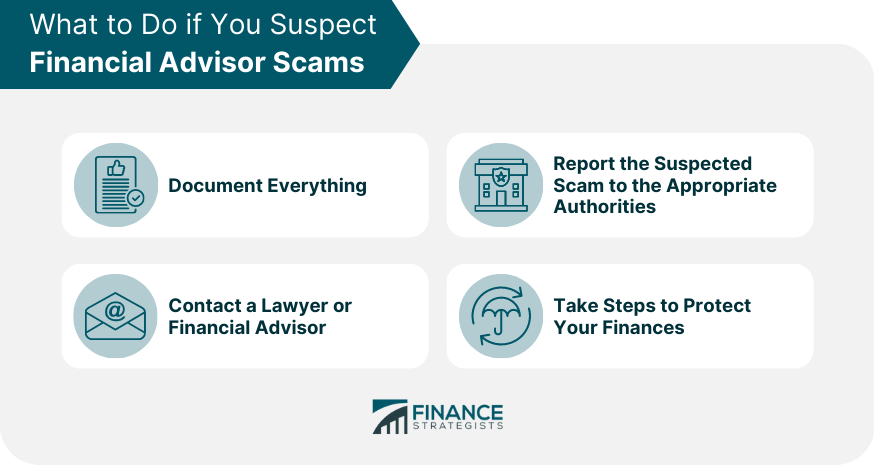A financial advisor scam refers to fraudulent and illegal practices used by individuals or companies who present themselves as financial advisors. Financial advisor scams can result in the loss of a significant amount of money, and it can take years for an investor to recover their losses. In some cases, the financial advisor may disappear with their client's money. These scams use fraudulent and illegal practices to deceive investors into investing money in schemes that are not legitimate. These scams can take many forms. By understanding financial advisor scams and the warning signs, investors can protect themselves from potential losses. Financial advisor scams can take many forms: Ponzi schemes are one of the most well-known types of financial advisor scams. They are named after Charles Ponzi, who became notorious for using this technique in the early 1900s. In a Ponzi scheme, the financial advisor promises high returns to investors, often in a short amount of time. The financial advisor then uses the money from new investors to pay the returns promised to earlier investors. The scheme continues until the financial advisor cannot attract enough new investors to meet the returns promised to existing investors. At this point, the scheme collapses, and many investors lose their money. Churning is another type of financial advisor scam that involves excessive trading of securities in a client's account for the financial advisor's benefit. The financial advisor may recommend trades that are not in the client's best interest but generate commissions for the advisor. The excessive trading can lead to high fees, which eat away at the client's investment returns. Churning is illegal, and financial advisors who engage in this practice can be held liable for any losses incurred by the client. Unsuitable investments occur when a financial advisor recommends an investment that is not appropriate for a particular client's financial situation, goals, or risk tolerance. For example, a financial advisor may recommend a high-risk investment to a client who has a low-risk tolerance or a client who is close to retirement. This type of financial advisor scam can result in significant losses for the client. Misrepresentation and omissions occur when a financial advisor misleads a client by providing false or incomplete information about an investment. The financial advisor may misrepresent the investment's risks, returns, or fees to convince the client to invest. They may also omit important information, such as conflicts of interest, that could impact the client's decision to invest. Identity theft is a type of financial advisor scam that occurs when a financial advisor steals a client's personal information, such as their Social Security number, to open accounts or make purchases without their knowledge. In this situation, the financial advisor may use the client's information to steal their money, open credit cards in their name, or obtain loans. Identity theft can have severe consequences for the victim and can take years to resolve. To protect yourself from financial advisor scams, it's important to be aware of the warning signs. Here are some of the most common red flags to watch for. Financial advisors who use high-pressure sales tactics may be trying to push clients into making a decision without fully understanding the investment. High-pressure sales tactics can include urgent deadlines, limited-time offers, or claims that the investment is a once-in-a-lifetime opportunity. Financial advisors who guarantee high returns are a warning sign of a potential financial advisor scam. No investment is risk-free, and promising high returns is unrealistic and likely to be false. Financial advisors who guarantee high returns may be trying to entice clients to invest without fully understanding the risks involved. Financial advisors who claim to have insider knowledge of an investment may be trying to convince clients to invest without providing a full understanding of the investment's risks. Insider knowledge is often illegal to act on and may be a warning sign of insider trading. Financial advisors who are not transparent about the fees, risks, or other important information related to an investment are a warning sign of a potential financial advisor scam. Clients have a right to know all the information related to an investment before making a decision to invest. Financial advisors who refuse to provide clients with the necessary information related to an investment may be hiding something. Clients have a right to know all the information related to an investment before making a decision to invest. Protecting yourself from financial advisor scams requires knowledge and diligence. Here are some tips on how to safeguard your investments and finances. Researching potential advisors thoroughly can help investors avoid financial advisor scams. Investors should check the advisor's credentials, background, and disciplinary history. Investors can also use online resources to research the advisor's reputation and read reviews from other clients. Investors should check the advisor's credentials and background before investing. They should ensure the advisor is registered with the appropriate regulatory bodies, such as the Securities and Exchange Commission (SEC) or the Financial Industry Regulatory Authority (FINRA). Investors can also use online resources to research the advisor's disciplinary history. Understanding the advisor's fee structure can help investors avoid financial advisor scams. Investors should know how the advisor is compensated, whether it's through commissions or fees, and how much they will be charged for their services. Investors should read all documents related to an investment carefully before signing. They should understand all the risks and fees associated with the investment before making a decision to invest. If something seems too good to be true or the financial advisor seems overly pushy, investors should trust their instincts and proceed with caution. Investors should not make investment decisions based solely on the financial advisor's recommendation and should take the time to research the investment thoroughly. If you suspect you have been a victim of financial advisor scams, it's essential to take action. Here are the steps you should take to protect yourself. If an investor suspects they have been a victim of a financial advisor scam, they should document everything related to the investment. This includes emails, account statements, and any other relevant information. Investors who suspect they have been a victim of a financial advisor scam should report the suspected scam to the appropriate authorities, such as the SEC or FINRA. They can also report the suspected scam to their state's securities regulator. Investors who suspect they have been a victim of a financial advisor scam should contact a lawyer or financial advisor to discuss their options. They may be able to recover some or all of their losses. Investors who suspect they have been a victim of a financial advisor scam should take steps to protect their finances. This may include freezing their accounts, monitoring their credit report for signs of identity theft, and changing their passwords. Financial advisor scams are fraudulent practices used by individuals or companies that present themselves as financial advisors. These scams can take many forms, including Ponzi schemes, churning, unsuitable investments, misrepresentation and omissions, and identity theft. To protect yourself from these scams, it's essential to be aware of the warning signs, such as high-pressure sales tactics, guarantees of high returns, promises of insider knowledge, lack of transparency, and refusal to disclose information. Investors should research potential advisors thoroughly, check their credentials and background, understand their fee structure, read all documents carefully before signing, and trust your instincts. If you suspect you have been a victim of a financial advisor scam, you should document everything, report the suspected scam to the appropriate authorities, contact a lawyer or financial advisor, and take steps to protect your finances. While financial advisor scams can be devastating, it's important to remember that there are many trustworthy and reliable financial advisors out there. By doing your research and working with a reputable financial advisor, you can make sound financial decisions and safeguard your investments. What Are Financial Advisor Scams?
Types of Financial Advisor Scams
Ponzi Schemes
Churning
Unsuitable Investments
Misrepresentation and Omissions
Identity Theft

Warning Signs of Financial Advisor Scams
High-Pressure Sales Tactics
Guarantees of High Returns
Promises of Insider Knowledge
Lack of Transparency
Refusal to Disclose Information

How to Protect Yourself From Financial Advisor Scams
Research Potential Advisors Thoroughly
Check the Advisor’s Credentials and Background
Understand the Advisor’s Fee Structure
Read All Documents Carefully Before Signing
Trust Your Instincts

What to Do if You Suspect Financial Advisor Scams
Document Everything
Report the Suspected Scam to the Appropriate Authorities
Contact a Lawyer or Financial Advisor
Take Steps to Protect Your Finances

Final Thoughts
Financial Advisor Scams FAQs
A financial advisor scam refers to fraudulent and illegal practices used by individuals or companies who present themselves as financial advisors. These scams often lead to the loss of investors' money and can take many forms, from Ponzi schemes to churning, to unsuitable investments and misrepresentation and omissions.
The warning signs of financial advisor scams include high-pressure sales tactics, guarantees of high returns, promises of insider knowledge, lack of transparency, and refusal to disclose information. It's essential to be aware of these red flags to protect yourself from potential scams.
To protect yourself from financial advisor scams, you should research potential advisors thoroughly, check their credentials and background, understand their fee structure, read all documents carefully before signing, and trust your instincts. It's also crucial to be aware of the warning signs of potential scams.
If you suspect you have been a victim of a financial advisor scam, you should document everything, report the suspected scam to the appropriate authorities, contact a lawyer or financial advisor, and take steps to protect your finances. It's important to act quickly to minimize the damage.
While financial advisor scams can be devastating, it's important to remember that there are many trustworthy and reliable financial advisors out there. By doing your research and working with a reputable financial advisor, you can make sound financial decisions and safeguard your investments. It's essential to be vigilant and carefully evaluate any financial advisor before working with them.
True Tamplin is a published author, public speaker, CEO of UpDigital, and founder of Finance Strategists.
True is a Certified Educator in Personal Finance (CEPF®), author of The Handy Financial Ratios Guide, a member of the Society for Advancing Business Editing and Writing, contributes to his financial education site, Finance Strategists, and has spoken to various financial communities such as the CFA Institute, as well as university students like his Alma mater, Biola University, where he received a bachelor of science in business and data analytics.
To learn more about True, visit his personal website or view his author profiles on Amazon, Nasdaq and Forbes.















